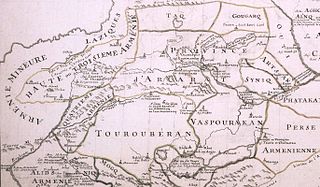Тмогвели, Саргис
Саргис Тмогвели (груз. სარგის თმოგველი) — грузинский государственный деятель и писатель армянского происхождения[1], ученый, ритор, философ XII—XIII веков. Сын Варама Мхаргрдзели. Член феодального рода Тмогвелидов[груз.].
Биография
Во время восстания Георгия, мужа Тамары, около 1191 года Саргис был одним из немногих дворян, оставшихся верными царице. За это он был щедро вознаграждён; ему была передана крепость Тмогви для обеспечения границ в Джавахети. В 1195 году он участвовал в Битве при Шамкоре. В 1200-х годах Шалва Торели-Ахалцихели и Саргис Тмогвели командовали грузинскими войсками во время победоносной кампании против Карса. В 1203 году он сражался в кампании в Двин.
Произведения
- «Висрамиани» — прозаическое переложение поэмы «Вис и Рамин» Фахраддина Гургани. Предполагаемый автор поэмы Дилариани[груз.].
- «Диларгетиани» (произведение не сохранилось, однако упоминается в последней строфе «Витязя в тигровой шкуре» Шота Руставели: «Дилapгeтa пeл Tмoгвeли, нeycтaнный языкoм»[2]).
Издания на русском языке
- Висрамиани / Перевод и изложение Б. Т. Руденко // «Нет у любви бесследно сгинуть права...»: Легенды о любви и дружбе. — М.: Московский рабочий, 1986. — С. 167-197. — (Однотомники классической литературы).
Литература
- Kartlis tskhovreba: a history of Georgia = K̕art̕lis c̕xovreba / Roin Metreveli, Stephen F. Jones. — Tbilisi: Artanuji Publishers, 2014. — 443 с. — ISBN 978-9941-445-52-1.
- კეკელიძე კ., ქართული ლიტერატურის ისტორია, ტ. 2, თბ., 1958;
- მესხია შ., საშინაო პოლიტიკური ვიტარება და სამოხელეო წყობა XII საუკუნის საქართველოში, თბ., 1979;
- გვახარია ა., ქართული საბჭოთა ენციკლოპედია, ტ. 9, გვ. 102, თბ., 1985.
Примечания
- ↑ Ludmila Motalova. Armenian culture in the Near East (англ.) // Inter-relations in Asia and Africa: Proceedings of Conferences Held by the Czechoslovak Society for Eastern Studies 1969 : [The 9th Orientalist Conference at Liblice,1969].. — 1969. — Т. 23. — С. 150-159.Оригинальный текст (англ.)Armenian often served as the medium for the transmission of a text, e. g. some of the works of Aristotle, Cyrus of Alexandria, and others, were translated into Georgian from Armenian texts. Georgian histories of literature quote several writers of Armenian origin, like S. Tmogveli, Feshand Pashvi-Berdvadze, while the Armenian Gevorg occurs in the history of Ethiopian literature. Some Byzantian scientists were Armenians, like the astronomer Bagrat in the eighth century, the philologist Hovhannes in the ninth cen\ury, the mathematician and geographer Nikolaios Artavazd Zmiurnaci in the fourteenth century; the seventeenth century Georgian historian and philologist Farsadan Georgidjanidze was also an Armenian. Centres of culture in the Near East periodically grew up with an ambiance favourable to the co-existence of different natural cultures and to mutual influences; in all these centres Armenians played a notable part: in Jerusalem, as we have seen above, and later in Tiflis in the fifteenth to eighteenth centuries. Tiflis was the cultural metropolis for Transcaucasia right into the twentieth century, and it was here that the eastern branch of Armenian culture centred up to the time when Yerevan ceased to be a backward provincial town (about the twenties of this century).
- ↑ Перевод П. А. Петренко.










